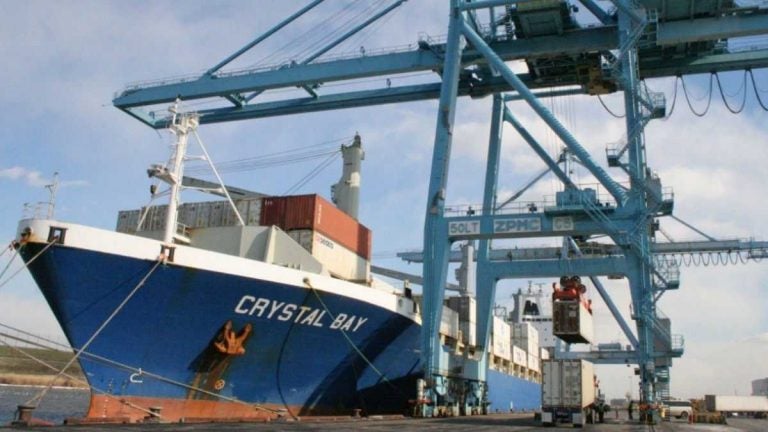Judge rules against Delaware port operator in tariff dispute
The judge also ruled Tuesday that GT USA Wilmington cannot block Buckeye Partners or its customers from accessing an adjacent fuel storage terminal.

The Port of Wilmington in Delaware. (Courtesy of Port of Wilmington)
The company that runs the Port of Wilmington under an arrangement with the state of Delaware is not entitled to charge terminal usage fees to the operator of a petroleum offloading operation and cannot block the operator or its customers from accessing an adjacent fuel storage terminal, a judge ruled Tuesday.
The ruling by Vice Chancellor J. Travis Laster comes almost two years after he issued a preliminary injunction prohibiting port operator GT USA Wilmington from preventing access to storage tanks owned by Buckeye Partners that hold gasoline and diesel fuel for distribution to gas stations and convenience stores throughout the mid-Atlantic region.
The Wawa convenience store chain accounts for about 85% of Buckeye’s business at the port.
Texas-based Buckeye, which manages more than 6,200 miles (9,970 kilometers) of petroleum pipelines and more than 100 truck-loading terminals, acquired the storage terminal from Magellan Midstream Partners in early 2020. The company also acquired leased dock space from which it offloads petroleum products from marine vessels through a pipeline and into the storage tanks.
A dispute arose, however, when GT claimed that Buckeye owed it more than $1 million in terminal usage fees under tariffs it had issued in 2018, and again in 2020, on stevedores or parties engaged in stevedoring, which is the physical handling of containers and cargo from vessels.
In April 2020, the dispute escalated to the point that GT USA Wilmington blocked Wawa fuel trucks from accessing the storage terminal.
GT USA Wilmington is a subsidiary of port management company Gulftainer, which is based in the United Arab Emirates. In 2018, state officials inked a deal under which Gulftainer obtained the rights to operate the port for 50 years in exchange for agreeing to make significant upgrades and to pay the state about $10 million annually in concession fees based on the volume of various types of cargo traveling through the port.
After taking over the port, GT imposed a new tariff structure, which included a new volume-based “terminal usage fee” on stevedoring. GT admitted that it imposed the terminal usage fee to cover the cost of the concession fee that it had to pay to the state.
Magellan, however, refused to pay the terminal usage fee, arguing it was neither a stevedore nor engaged in stevedoring. Buckeye maintained that position after acquiring Magellan, arguing that it did not owe the fees and that, even if it did, GT had no right to block access to Buckeye’s storage tanks, which are accessible only by private roads running through the port property.
Buckeye argued, as did Magellan, that it does not use third-party stevedores, and that hooking up hoses to send petroleum products from tanker ships through a pipeline to its storage terminals is not subject to the terminal usage fee.
GT countered that Buckeye did indeed act as a stevedore, at least for Wawa, and that it owed GT at least $1 million for breaching the terms of the tariff and its lease. GT also argued that Buckeye had no valid easement right over the port’s main gate road, and that Buckeye’s lease payments do not cover the same services as the tariff.
The judge disagreed, ruling in favor of Buckeye.
“On the first issue, the company proved that it does not owe the terminal usage fees because it was neither a stevedore nor engaged in stevedoring,” Laster wrote. The judge said the definition of stevedoring in the 2018 tariff plainly did not apply to Buckeye, and that the definition in the 2020 tariff, which redefined the term, was ambiguous. Given that GT was the sole drafter of the tariff, any ambiguity must be held against GT, Laster said.
Laster also ruled that the rent that Buckeye pays for the dock space lease entitles it to use the terminal as it always has, without having to pay any additional amounts, and that GT did not provide any incremental services in exchange for the 2018 usage fee.
“The contractually agreed-upon rent therefore takes precedence and precludes the imposition of the 2018 usage fee,” he wrote.
As far as access to the storage tanks, Laster said Buckeye had proven that the company has the right to use the disputed roads in connection with its terminal business.
“We appreciate Vice Chancellor Laster’s thoughtful decision and the court’s thorough review of this important matter,” Buckeye Partners said in a prepared statement.
A spokeswoman for GT USA Wilmington did not immediately respond to an email seeking comment.
WHYY is your source for fact-based, in-depth journalism and information. As a nonprofit organization, we rely on financial support from readers like you. Please give today.






